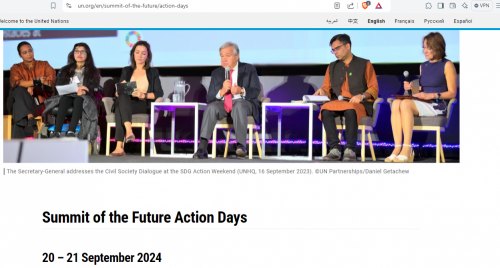
https://live.worldbank.org/en/event/2024/choosing-future-education-clima...
https://live.worldbank.org/en/event/2024/choosing-future-education-clima...
WASHINGTON, Sept. 4, 2024 – A staggering 400 million students globally experienced school closures from extreme weather since 2022, according to a new World Bank report released today. The report examines the detrimental impacts of climate change on education in low- and middle-income countries and offers solutions to harness education to spur climate action. It also estimates that a one-time investment of $18.51 per child can mitigate the impact from climate shocks.
New analysis in the report, “Choosing Our Future: Education for Climate Action”, shows that the climate crisis is hitting education the hardest in low-income countries, with 18 school days lost annually on average, compared to 2.4 days in wealthier nations. A 10-year-old in 2024 will experience three times more floods, five times more droughts, and 36 times more heatwaves over their lifetime compared to a 10-year-old in 1970. And even when schools are open, students are losing learning due to climate. In Brazil, students in the poorest 50% of municipalities could lose half a year’s learning due to heat alone.
“Young people are directly impacted by this crisis, and they are eager to act. Yet education systems are not delivering the information, skills and opportunities they need in a climate-affected world,” said Mamta Murthi, Vice President, People Vice Presidency, World Bank. “This is a missed opportunity to harness the power of education so we can adapt to and mitigate the climate crisis.”
Education is not only under threat from climate change—it is massively overlooked in climate financing. Past analyses have shown that a mere 1.5% of climate finance goes to education. But new estimates in the report show that for $18.51 per child, schools can help better safeguard learning from climate change – by improving classroom temperature, building resilient infrastructure, and training teachers, among other adaptation measures.
“The promising news is that there are many low-cost steps that governments can take to harness education and learning for climate action while adapting education systems to climate change,” said Luis Benveniste, Global Director of Education at the World Bank. “Improving school infrastructure, ensuring learning continuity, and leveraging students and teachers as effective agents of positive change can all contribute to a more livable planet.”
Surveys in the report shed light on the disconnect between the eagerness of young people in low- and middle-income countries to do something and the lack of knowledge and skills to act. Around 65% of young people across eight countries believe their futures are at stake if they don’t develop green skills, but 60% also believe they didn’t learn enough about climate change in school. The report shows that each year of education increases climate awareness by nearly 9%, based on data from 96 countries. It argues that education is key to addressing these gaps in information, skills, and knowledge and driving climate action worldwide by reshaping mindsets, behaviors, skills, and innovation.
With demand for green skills outpacing supply in many low- and middle-income countries, the report busts commonly held myths. For instance, around 73% of young people across eight countries mistakenly believe that they cannot get a green job without Science, Technology, Engineering, and Math (STEM) skills. But new World Bank data and analysis show that green skills are being demanded at nearly all skill levels and sectors across low- and middle-income countries. For example, 31% of green jobs in the Philippines are medium skill roles.
The report lays out evidence, data, on-the-ground examples, and a policy agenda to support country efforts. For example, improving foundational and STEM skills, mainstreaming climate education, and building teacher capacity will help harness schooling for climate action. And governments can prioritize green skilling and innovation in tertiary education to help supercharge a shift to more sustainable practices.
GO TO SPEAKERS
How can education systems empower, equip, and skill young people for climate mitigation and adaptation? Education is key for addressing the climate crisis through awareness, behavior change, and skills for green transitions. And yet, education is massively overlooked in climate financing.
Worldwide, education is the single strongest predictor of climate change awareness and higher levels of education are associated with pro-environmental behaviors, preferences for environmentally friendly policies, and stronger adaptive capacity. Education can generate green skills at scale to propel green transitions – preparing the youth of today for an estimated 100 million new green jobs, or for existing jobs that will require green skills.
Education can propel climate action. But at the same time, climate change is impeding progress for education.
Climate change induced heat and extreme weather events are significantly disrupting learning. Millions of students worldwide face school closures due to extreme weather events. Low-income countries are disproportionately affected. Even if schools remain open, hotter temperatures have been shown to inhibit learning. As the frequency and severity of extreme weather grows, it’s clear that education systems need to adapt for a changing climate.
The event spotlighted how governments could harness education for climate action and adapt schools for climate change, launching the report “Choosing Our Future: Education for Climate Action.” Panelists explored policies, lessons, and financing strategies to achieve this.
For more information, please visit:









